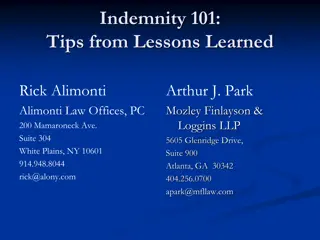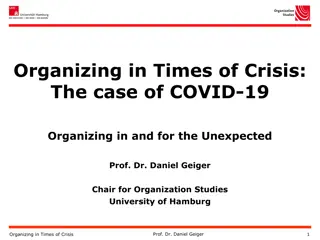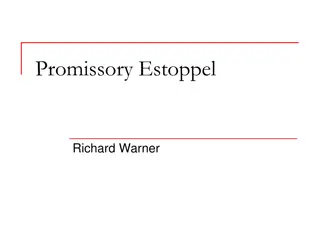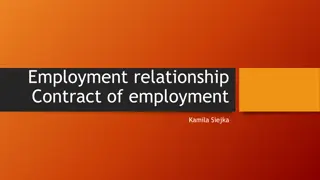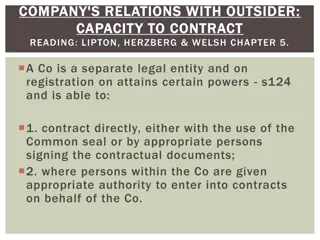Contractual Obligations and Unexpected Circumstances
Hathaway v. Sabin and UCC 2-609 case examines a situation where a concert promoter, Sabin, failed to provide a concert hall due to a snowstorm, even though the musicians arrived on time. The court discusses the principle that mere uncertainty about performance does not excuse a party from its contractual obligations. It questions whether Sabin reasonably expected the musicians not to perform and whether he breached the contract by canceling the concert prematurely.
Download Presentation

Please find below an Image/Link to download the presentation.
The content on the website is provided AS IS for your information and personal use only. It may not be sold, licensed, or shared on other websites without obtaining consent from the author.If you encounter any issues during the download, it is possible that the publisher has removed the file from their server.
You are allowed to download the files provided on this website for personal or commercial use, subject to the condition that they are used lawfully. All files are the property of their respective owners.
The content on the website is provided AS IS for your information and personal use only. It may not be sold, licensed, or shared on other websites without obtaining consent from the author.
E N D
Presentation Transcript
Hathaway v. Sabin and UCC 2-609 Richard Warner
Hathaway v. Sabin Sabin and Hathaway entered a contract under which Sabin was to provide a concert hall and pay $75 to Hathaway for a musical performance by a quartette. Thirty-six hours before the concert, a particularly severe snowstorm occurred, and Sabin, the concert hall owner, concluded that the musicians, who were then in another town, would not be able to arrive in time for the concert. Since he assumed the musicians would not arrive in time, Sabin did not prepare the hall for the concert, and, when the musicians did in fact arrive on time, he was unable to provide them with a hall for the concert. Sabin claimed that he reasonably assumed the musicians would not be able to perform their side of the contract, and hence that he was not obligated to provide the concert hall.
The Old Rule Hathaway v. Sabin is an 1891 case The rule at that time was that that mere uncertainty about performance did not excuse the insecure party from its obligations. The court says It is doubtless true that, [1] when one party has put it out of his power to perform, the other party can maintain an action without having tendered performance on his part. [2] But a party who becomes involved in difficulties for which he is not responsible, if ultimately able to perform, is not to be deprived of the benefits of his contract because of an assumption by the other party that the difficulties would prove insurmountable.
What Bothers The Court It is apparent, also, that the defendant's course was determined before the time when action on his part became necessary. It was not necessary to commence the heating of the hall until 4 o'clock in the afternoon, but about 10 o'clock in the forenoon the defendant telephoned the manager that, owing to the condition of the streets in Montpelier, it would be impossible to have the entertainment that evening.
Reasonable Reaction? Sabin (the concert promoter) reasonably expected the musicians would not perform. Did he based his actions reasonably on this expectation? (a) Yes (b No
A Good Rule? Consider the Hathaway rule: [1] when one party has put it out of his power to perform, the other party can maintain an action without having tendered performance on his part. [2] But a party who becomes involved in difficulties for which he is not responsible, if ultimately able to perform, is not to be deprived of the benefits of his contract because of an assumption by the other party that the difficulties would prove insurmountable. Under this rule, Sabin called the concert off at 4 pm and then the muscians showed up, would Sabin breach? (a) Yes (b) No
A Good Rule? The snowstorm was particularly severe. Assume that it made travel sufficiently difficult, that a reasonable person would conclude that the musicians would not arrive on time for the concert. Given that Sabin has reasonable grounds to think the musicians would not show up, why shouldn t he be allowed to suspend his performance?
2-609. Right to Adequate Assurance of Performance. A contract for sale imposes an obligation on each party that the other's expectation of receiving due performance will not be impaired. (1) When reasonable grounds for insecurity arise with respect to the performance of either party (2) the other may in writing demand adequate assurance of due performance and (3) until he receives such assurance may if commercially reasonable suspend any performance for which he has not already received the agreed return.
Land OLakes Land O Lakes sold milk and ice-cream to Fredjo s under a requirements contract for several years without incident. Early in 1987, however, Land O Lakes discovered that Fredjo s had a past due balance in excess of $330,000. Land O Lakes informed Fredjo s in writing that it would stop shipping products until Fredjo s paid its balance due. Fredjo s made no payments, and, in September 1987, Lakes stopped shipping. Fredjo s past due balance of over $330,000 (a) did not give Land O Lakes reasonable grounds thinking that Fredjo s would not fulfill its contractual obligation to pay for shipments of milk and ice-cream. (b) gave Land O Lakes reasonable grounds thinking that Fredjo s would not fulfill its contractual obligation to pay for shipments of milk and ice-cream.
The Demand In Writing Land O Lakes sold milk and ice-cream to Fredjo s under a requirements contract for several years without incident. Early in 1987, however, Land O Lakes discovered that Fredjo s had a past due balance in excess of $330,000. Land O Lakes informed Fredjo s in writing that it would stop shipping products until Fredjo s paid its balance due. Fredjo s made no payments, and, in September 1987, Lakes stopped shipping. The court held that Land O Lakes provided the 2-609 written demand of adequate assurance of performance when it informed Fredjo s that it would stop shipping products until Fredjo s paid its balance due. The courts interpret the requirement of a written demand quite liberally. They may waive the requirement if the circumstances make it clear that the insecure party will suspend its performance until it receives adequate assurance of that the other party will perform.
Under UCC 2-609 Land O Lakes (a) can stop sending milk and ice-cream to Fredjo. (b) Can stop sending stop sending milk and ice-cream to Fredjo if it is commercially reasonable to do so.
The Common Law The Restatement of Contracts, Second 251 takes a somewhat similar position: (1) where reasonable grounds for insecurity arise to believe that the obligor will commit a breach by non-performance (2) that would of itself give the obligee a claim for damages for total breach . . . (3) the obligee may demand adequate assurance of due performance and until he receives such assurance (4) may if reasonable suspend performance. Farnsworth comments: Under the Restatement Second the obligee is given a choice as to whether to treat the failure to provide assurance as a repudiation. But the Restatement Second gives the obligee the right to demand assurances only where the prospective failure would amount to a total breach. If the prospective failure is one that would be excusable on grounds of impracticability, for example, the obligee would have no right to demand assurance under this rule. E. ALLEN FARNSWORTH, CONTRACTS 675, n. 27 (1990).
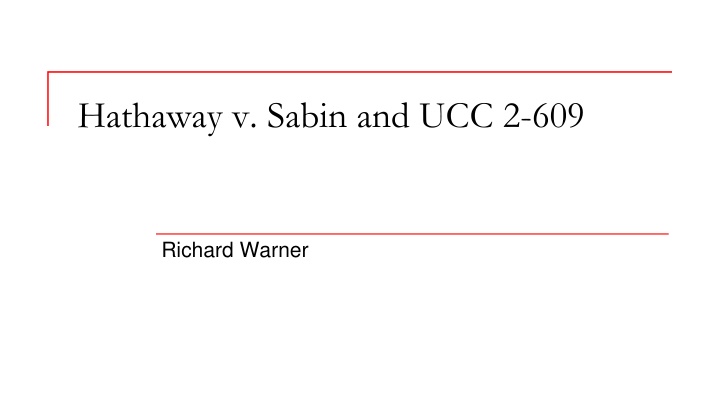



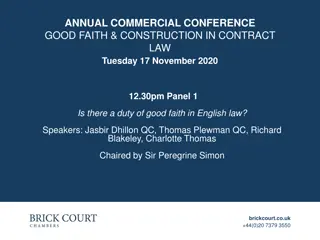
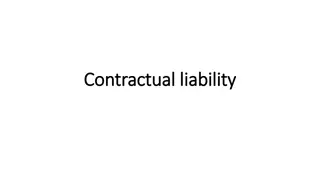
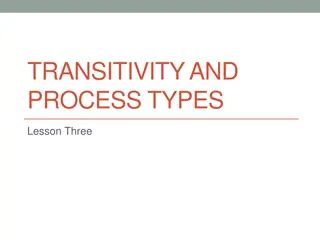
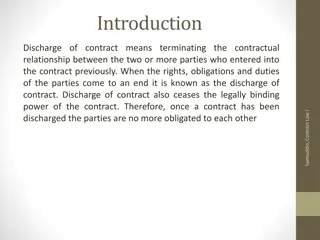
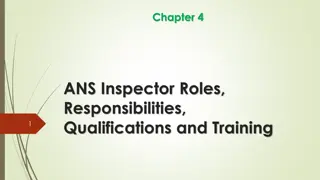

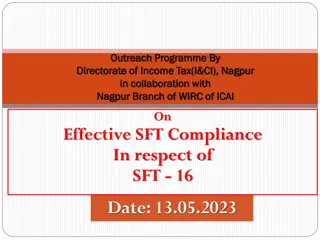
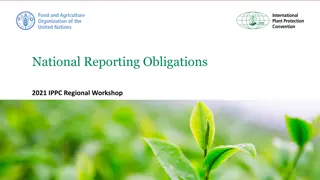
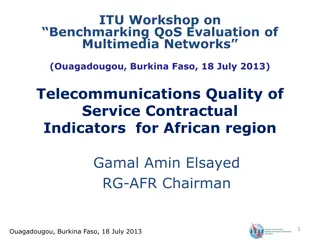


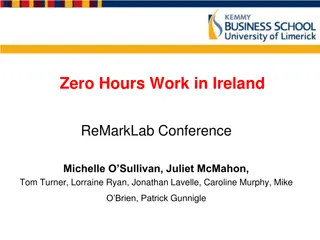
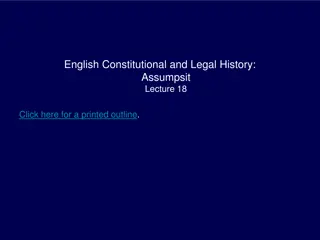
![Importance of Rock v. MWB [2018] UKSC 24 as Explained by Lord Sumption](/thumb/193348/importance-of-rock-v-mwb-2018-uksc-24-as-explained-by-lord-sumption.jpg)
